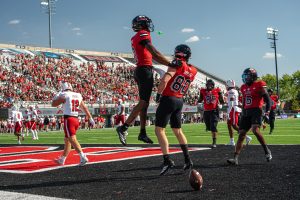Retiring dean to remain at NIU to teach
August 28, 1989
Almost a decade after the position was filled, the College of Law dean is stepping down.
Leonard Strickman, having achieved the goals he set for himself when hired in 1981, will retire at the end of the 1989-90 school year. Strickman, 47, will remain at NIU to teach constitutional and education law.
“You get to a point in an administrative job when you say, ‘I have achieved what I set out to achieve,'” Strickman said.
What Strickman accomplished was to guide a fledgling law school through full professional accreditation by the American Bar Association in the summer of 1982, membership and academic accreditation in the Association of American Law Schools in 1985 and the development of the NIU Law Review, a professional journal run by NIU law students.
NIU acquired the law school in 1979 when legislation authorized the transfer of the school from Lewis University College of Law in Glen Ellyn.
“When Dean Strickman came to NIU, there were several daunting tasks facing our new College of Law,” NIU President John La Tourette said. “Through his leadership, we were able to take a formerly floundering law school—one in financial trouble and in danger of losing its provisional accreditation—and in record time, turn it around.”
With his last year at the helm, Strickman will have been the dean for nine years, more than twice the average duration of American law school deans. Strickman said a primary reason for the brief tenures is that law departments, unlike others, combine the chairmanship and deanship into one position and so law school deans are “on the front line with both faculty and students,” as well as the university.
Strickman attributed his longevity to the “strong sense of momentum” from early successes and support from the university.
In Strickman’s eight previous years, the school hired more than half of the 20 faculty members that have contributed to the school’s over 90 percent graduate placement rate.
The growing prestige of the college and accreditation by the ABA and the AALS remain the “high points” of his deanship, but Strickman also remembers the two visits to NIU by U.S. Supreme Court Justice Harry Blackmun and the visit last year by Chief Justice William Rehnquist.
Strickman said that although such visits are largely symbolic, the justices’ presence reflected the legal profession’s acceptance of the NIU law school.
In his last year, Strickman will continue to work toward establishing the collaboration between the college of law and the University of Illinois College of Medicine in Rockford that will bring together medical students, medical residents and law students to further study medical malpractice.
Strickman sees more emphasis being placed on fundraising for the school now that it is established as well as a trend toward more interdisciplinary education and a heightened sensitivity to ethical issues.
He added that he will not take part in the national search for his replacement in order to facilitate his succesor’s “completely new relationship with the faculty.”
Strickman received his A.B. degree from the University of Rochester, NY, and a J.D. degree from Yale University. He taught at the Boston University of Law School and Boston College before being selected from 80 candidates to succeed interim dean John Bainbridge.
Strickman said he will miss “the sense of having a real and discernible impact on the development of an institution.”






